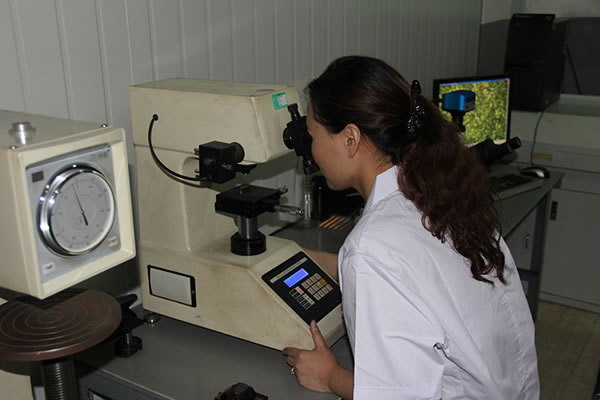- Home
- Quality Control
In Caston, all of the drilling tools are manufactured in conformity with API standards, ensuring the quality of our products. We have introduced magnetic particle detector, ultrasonic flaw detector, screw detector, concentricity tester, hardness tester, and wall thickness tester into the inspection system to inspect the physical and mechanical performance of the drill tools. Besides, we possess an advanced laboratory to perform chemical composition analysis, mechanical performance testing, and metallographic analysis. Caston is now certified by ISO9001: 2008, API Q1, and API 5DP.

Ultrasonic Flaw Detection
The ultrasonic flaw detector scans the welding seams of drill pipe with 45 degree drill probe manually. It determines whether there are defects on the welding seams by comparing the reflected wave and the reflected wave of standard samples
Magnetic Particle Test
We apply this magnetic particle testing machine to know the defects on workpieces' surface
Pressure and Concentricity Test
Pressure tests are conducted upon the welding seams for each 120 degree along the round section

Ultrasonic Flows Detection Line

Impact Test
Under a certain temperature, the head of impact tester impacts and penetrates the sample, and then we will get to know the sample's impact resistance and toughness by measuring the energy the head has consumed.
Metallographic Analysis
Microstructure detection for drill pipe body, sub saver, and welding seams

Tensile Test
In line with API spec 5Dp standards
Hardness Test
Hardness test for drill pipe body, sub saver, and welding seams after heat treatment
Pipe Thread Test
In accordance with API spec7 standards

Damage Test for Cutter
Using steel hammer to hit the cutter so as to test the cutter's strength and toughness, as well as firmness of welding
Torque Test for Thread
Determining the wear and tear condition of pipe thread by simulating the working of drill pipe
Spectral Analysis
Detecting the chemical components of raw materials with the spectrum analyzer
